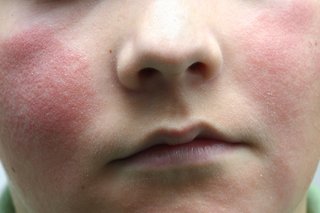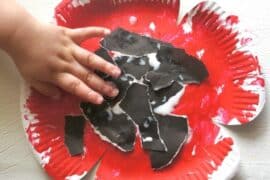Welcome, Lovely Parents! A Guide to Slap Cheek in Adults Just for You!
Do you remember that bright, rosy rash your little ones might have experienced after a playground romp or during a visit to the pediatrician’s office? Known colloquially as slap cheek, this ailment, also called fifth disease, isn’t exclusive to children. Surprise! Adults can get it too. And since we parents often put ourselves last, it’s time to take a few cheerful moments to understand slap cheek syndrome in adults. So, let’s dive into this comprehensive guide filled with all the knowledge you need – delivered with a smile!
What Is Slap Cheek Syndrome?
Fifth disease, or parvovirus B19 to get all scientific, causes slap cheek syndrome. While it usually makes its rounds among the kiddos, adult slap cheek is a thing, too! No need to blush; being informed is the first step in taking care of yourself and your family.
Slap Cheek in Adults: Rare but Real
It’s true – adults can contract slap cheek, though it’s less common than in children. When adults do catch this viral infection, the symptoms can be a bit different, and sometimes, more severe. But fear not! Knowledge is the best medicine (well, after actual medicine, of course).
How Would You Know It’s Slap Cheek?
Perhaps you’re feeling a tad under the weather with flu-like symptoms, or maybe you’ve noticed that distinctive bright red rash across your cheeks. These could be tell-tale signs of slap cheek. Let’s not jump to conclusions – we’ll get into the nitty-gritty of symptoms in just a tick.
Symptoms of Slap Cheek in Adults: Beyond the Blush
Fifth disease starts out sneaky, with symptoms that mimic the flu. But there’s more than just feeling a bit off:
- Fever and Fatigue: These buddies often show up first, making you feel as droopy as a flower without water.
- Aches and Pains: Sore joints? Check. They can hang around longer than a distant relative after the holidays.
- The Signature Rash: Unlike the slap-worthy redness seen in children, adults might not always sport this look. But if you do, it’s unmistakeable – as if you’ve been sun-kissed by a cheeky little elf!
Causes: How Did Slap Cheek Find Me?
Now, don’t think you’ve been singled out by slap cheek. This virus spreads just like a juicy piece of gossip – through respiratory secretions. Simple things like talking, coughing, or sneezing can share the love, so to speak.
Transmission: Playing Tag with a Virus
Remember when you told your kiddos to cover their mouths when they cough? Well, the same goes for us grown-ups. The virus is most contagious before you even realize you have it – sneaky, isn’t it?
Treatment: Giving Slap Cheek a Timeout
While there’s no specific cure for fifth disease, treating the symptoms can make you feel a whole lot better. Pain relievers for achy joints and rest for that tired body can work wonders. But we’ll go deeper into the treatment options soon – promise!
Prevention: Keeping Slap Cheek at Bay
No one has time for a timeout with slap cheek. Good hygiene is your knight in shining armor here. Washing hands like a champion and keeping away from people who could share their viral friends with you can save the day.
Oh, the wonders of being a parent! You’re doing a marvelous job taking care of those little ones, and now it’s time to remember you need care, too. ‘Cause let’s face it, slap cheek in adults can become quite the party pooper. But don’t worry, our handy guide will have you ready to face this colorful visitor with all the grace and knowledge of a seasoned pro.
Stick around as we unpack more about this charming little virus in our upcoming sections. You’ll be armed with the know-how to tackle slap cheek, maintain your superhero parent status, and do it with a smile that’s all your own – no cheeky rash required!
Don’t let slap cheek catch you off guard. Ensure you’re informed, prepared, and ready to keep yourself and your loved ones healthy and happy. After all, isn’t that what parenting is all about? Stay tuned for more helpful tips and information to help you tackle slap cheek in adults, because being forearmed is being forewarned – and that’s always something to be cheerful about!

5 Things Parents Should Know in Preparing for Slap Cheek in Adults
- The Incubation Period is Tricky: Slap cheek has an incubation period of 4 to 14 days before symptoms show, but it can extend up to 21 days. During the early stages, you might not even know you’re contagious. This means paying extra attention to your health after hearing about outbreaks in your community or if your child comes home with that tell-tale glow on their cheeks.
- Immunity is Spotty: If you had slap cheek as a child, you might think you’re invincible. But here’s a little nugget to chew on – not everyone develops immunity. So, yes, you can still join the slap cheek club even if your childhood pictures feature that fabulous rash. Be sure to monitor your symptoms and those of other adult family members.
- Consult with Your Healthcare Provider: If you’re pregnant or have a weakened immune system, slap cheek could have more serious implications. The virus can affect unborn babies and those with certain blood disorders or immune deficiencies. A quick visit or call to your doctor can clear up any worries and provide the best course of action.
- Slap Cheek Spreads in Schools and Workplaces: Just like in nursery rhymes, everything that happens in school doesn’t stay in school. Slap cheek loves to hitch a ride home on your kids or through your colleagues. Keep school and work administrators informed if you or your child contract the virus, and ask about their health policies.
- Home Care is Key: There’s a lot you can do at home to ease slap cheek symptoms. Keeping hydrated, resting, and OTC painkillers can be your best buddies. But remember, always follow the guidance for medications given by your healthcare provider, especially when it comes to treatments for your children.
Deep Dive Into Treatment and Recovery
While you’re snuggling under your favorite blanket, let’s explore how to manage those symptoms. Over-the-counter medications like ibuprofen or acetaminophen can help with fever and joint pain, but steer clear of aspirin in children to avoid the risk of Reye’s syndrome. Adults with severe joint pain may need additional medications or therapies recommended by their doctor.
Rest is not just a good idea – it’s a necessity. Your body needs downtime to fight off the virus, and hey, it’s a great excuse to binge-watch your favorite shows! Stay cool if you have a rash, as heat can make it more pronounced – think of it like calming down an over-enthusiastic blush.
Adults with Slap Cheek: Lifestyle Adjustments
During your recovery, you may need to cut back on activities that stress your joints or leave you fatigued. Communicate with your employer about your condition so they understand any temporary limitations or need for sick leave. And don’t forget about making small changes at home to lower your physical exertion.
Support and Understanding
Battling slap cheek can feel isolating, especially if your family is spinning around you at usual speed. Share what you’re going through with friends and loved ones and don’t shy away from asking for help. Need someone to drop off a meal or entertain the kids for an hour? People love to be needed, so let them show their support.
Remember, getting through slap cheek is a temporary journey. With thoughtful preparation, top-notch hygiene practices, and a supportive environment, you’ll be back to your superhero duties in no time. Keep this guide handy, and you’ll navigate slap cheek with confidence and care!
See more great Things to Do with Kids in New Zealand here. For more information see here
Disclaimer
The articles available via our website provide general information only and we strongly urge readers to exercise caution and conduct their own thorough research and fact-checking. The information presented should not be taken as absolute truth, and, to the maximum extent permitted by law, we will not be held liable for any inaccuracies or errors in the content. It is essential for individuals to independently verify and validate the information before making any decisions or taking any actions based on the articles.




